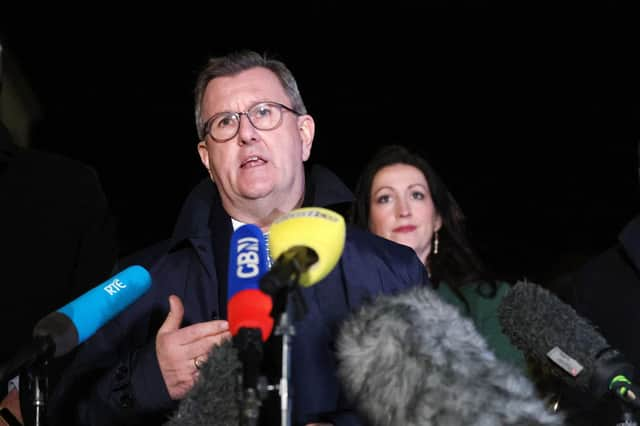Owen Polley: The DUP seems muddled in its stance on Northern Ireland having a hybrid economic status under the UK and EU


In the House of Commons, the East Antrim MP, Sammy Wilson, said it was impossible for Northern Ireland to have ‘pure access’ to both the EU and the UK markets. One or other had to be compromised.
Meanwhile, in response, Lagan Valley MLA Emma Little-Pengelly told the BBC’s Good Morning Ulster programme that the DUP wanted to “protect access to both markets”. That was, she said, her party’s established position.
Advertisement
Hide AdAdvertisement
Hide AdWas this apparent disagreement a sign of tensions in the DUP, evidence of confusion about protocol issues or merely a difference in emphasis?
In his New Year’s message, the party’s leader, Sir Jeffrey Donaldson, certainly seemed closer to Mrs Little-Pengelly’s position. He wrote that restoring our place in the UK internal market was not ‘mutually exclusive’ with retaining access to the EU economy.
Maybe so, but, of course, it depends on what exactly he means by ‘access’.
During 2022, British businesses sold £340 million worth of goods and services to the EU, so every part of the UK has a degree of ‘access’ to the bloc.
Advertisement
Hide AdAdvertisement
Hide AdWith that in mind, it would have been reasonable for Sir Jeffrey to say that he wanted to retain the most access to the EU that is compatible with Northern Ireland’s full and uncompromised place in the UK internal market.
Brussels has insisted repeatedly that we cannot have complete access to its market without barriers to Great Britain. The DUP leader will not have missed it, but that’s exactly what the two sides have argued about for almost eight years.
Early in that process, our government effectively accepted claims by northern separatists and Dublin that new infrastructure at the land border with the Republic was unacceptable. The EU, for its part, demanded that, in order to keep that frontier seamless, we must remain in its single market for goods, accept tracts of Brussels’ law and apply extra checks and paperwork to trade with the rest of our own country.
That’s why, when he spoke to the News Letter about his House of Commons’ intervention, Mr Wilson said, “You can have pure access to the EU market and compromised access to the UK market or vice versa, you can’t have both. The EU’s price for having access to their market – which is not as valuable – is that we have restrictions when it comes to the Great Britain market.”
Advertisement
Hide AdAdvertisement
Hide AdIt is senseless to dispute this statement, because it is simply a statement of fact. To further emphasise that point, in Thursday’s paper, the leading economist Dr Esmond Birnie explained, “Yes, there could be some gains if NI retained full access to the EU’s single market. But, against that, is the likelihood that Windsor Framework arrangements over the long run are likely to imply an unravelling of our previously very high integration into the rest of the UK.”
For unionists, the central argument, whether it was deployed against Theresa May’s backstop, Boris Johnson’s protocol or Rishi Sunak’s framework, has always been that our place in the United Kingdom and its market should be prioritised over seamless trade with the EU. If that means losing some degree of ‘access’ to the single market, that’s a sacrifice worth making. Northern Ireland’s interests are served best by playing a full role in Britain’s economy.
You can argue, as a unionist, that it’s no longer possible to roll back the protocol or the framework completely, so we must try to secure the best outcome short of that. You can even make the exceptionally flimsy argument that the EU has been unreasonable up to now, but may change its mind and give us full access without insisting that we compromise our position within the UK.
That would at least be consistent with pro-Union ideas, even if no-one took it seriously.
Advertisement
Hide AdAdvertisement
Hide AdThe problem with the DUP emphasising that it wants to maintain our current level of access to the EU, is that it implies that it is prepared to pay a price.
At best, it muddles the message that our status in the UK internal market is an overwhelming priority. At worst, it undermines that case and comes close to accepting the ‘best of both worlds’ claptrap that Sir Jeffrey flirted with when the protocol was first implemented.
I’ve written before about the importance of two competing strands of unionism in determining the health of the Union. The UK-facing type wants to play a full role in the politics, economy and society of its nation; but the exceptionalist kind is comfortable with being a ‘place apart’ from the rest of the UK.
It supports devolution instinctively, rather than accepting it reluctantly in practice, it’s obsessed with gaining ever more funding from Westminster and it always seems to find a reason to argue that we should be an exception to the British norm.
Advertisement
Hide AdAdvertisement
Hide AdIt could be that this rift again defines the emerging unionist landscape. Regrettably, the Ulster Unionist Party sounds as if it increasingly wants to embrace Northern Ireland’s hybrid status, as a semi-detached part of the UK with swathes of life under Brussels’ authority. Last week, it issued a statement hailing the potential of EU access and urging a reformed executive to exploit it.
Will the DUP follow that example, or will it at least maintain the theoretical position that the Union must be repaired and strengthened?